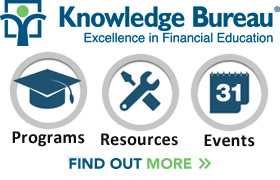
The UHT May Be Cancelled, But Vacancy Taxes Remain
As tax professionals, you are keenly aware of the constant changes our federal government makes to the Income Tax Act. Adjustments are made, and you must adapt. Not often, though, is a tax eliminated altogether. But in the case of the Underused Housing Tax (UHT), that is exactly what has happened – it was cancelled in the federal budget of November 4, 2025, but Canada’s underused housing taxes have not been eliminated. Here’s what you need to know for tax season 2026.Introducing the New DAC Acuity 2020
 Canada’s longest running conference for top advisors in the tax, accounting and financial services is getting an exciting new mandate. Knowledge Bureau’s highly successful DAC (Distinguished Advisor Conference) will morph into a modern new program called DAC Acuity 2020, and will be held in Niagara Falls from October 28 to 30, 2020.
Canada’s longest running conference for top advisors in the tax, accounting and financial services is getting an exciting new mandate. Knowledge Bureau’s highly successful DAC (Distinguished Advisor Conference) will morph into a modern new program called DAC Acuity 2020, and will be held in Niagara Falls from October 28 to 30, 2020.
DAC 2019 New Advisor Award Winner: Steven Furtado
 Knowledge Bureau is pleased to announce that Steven Furtado, Mandeville Private Client Inc./Zagari, Simpson & Associates, has been selected as the 2019 winner of the Distinguished New Advisor Award. The award will be presented at the Opening Ceremonies of the Distinguished Advisor Conference (DAC) in Puerto Vallarta, November 10-13.
Knowledge Bureau is pleased to announce that Steven Furtado, Mandeville Private Client Inc./Zagari, Simpson & Associates, has been selected as the 2019 winner of the Distinguished New Advisor Award. The award will be presented at the Opening Ceremonies of the Distinguished Advisor Conference (DAC) in Puerto Vallarta, November 10-13.
Farmers and Fishers: Tax Instalments are Due Soon
 Farmers and fishers who are required to make tax instalment payments need to do so once per year on December 31. Now is the time to calculate 2019 income and potential instalment remittances, but in the alternative, to consider whether any farming losses are claimable. Will they pass the scrutiny of a tax auditor? With the instalment deadline as a trigger, here are some common questions and answers on how farming loss claims are handled.
Farmers and fishers who are required to make tax instalment payments need to do so once per year on December 31. Now is the time to calculate 2019 income and potential instalment remittances, but in the alternative, to consider whether any farming losses are claimable. Will they pass the scrutiny of a tax auditor? With the instalment deadline as a trigger, here are some common questions and answers on how farming loss claims are handled.
Boost Your Tax Knowledge and Earn CE Credits with the Tax in Practice Program
 As part of our commitment to your ongoing professional development, Knowledge Bureau has collaborated with Sun Life Financial to bring you Tax in Practice, a free online program about common tax planning issues faced by investors and business owners. The program consists of 10 CE-accredited modules covering a wide range of topics like tax strategies in the sale of a business and use of trusts in tax and estate planning, and that's just naming a few!
As part of our commitment to your ongoing professional development, Knowledge Bureau has collaborated with Sun Life Financial to bring you Tax in Practice, a free online program about common tax planning issues faced by investors and business owners. The program consists of 10 CE-accredited modules covering a wide range of topics like tax strategies in the sale of a business and use of trusts in tax and estate planning, and that's just naming a few!



